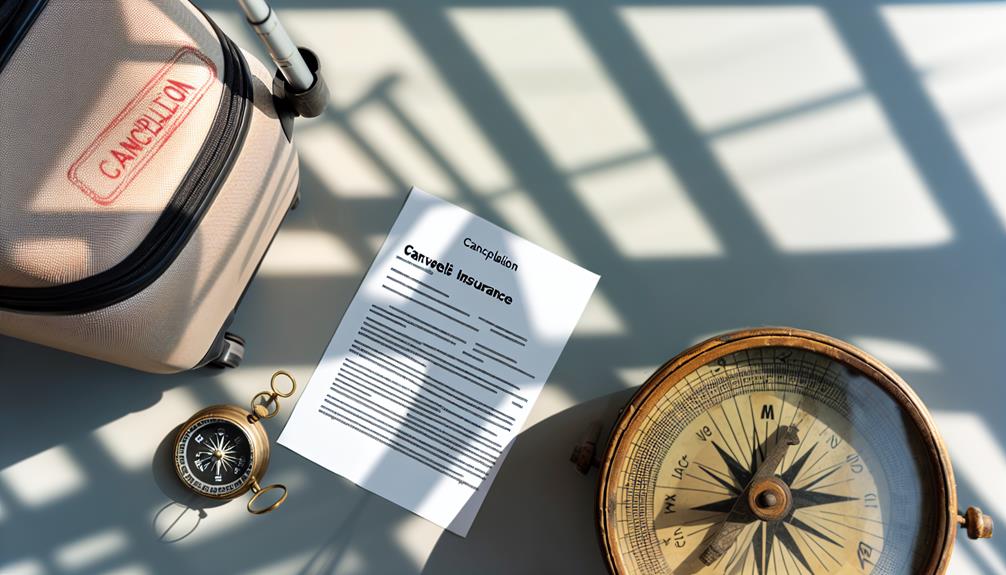To cancel your trip plans with journey insurance, start by contacting your travel suppliers to officially cancel. Gather all necessary documentation, including proof of payment and your travel insurance claim form. Make certain to notify your insurance provider within 72 hours of cancellation. Attach evidence supporting your cancellation reason, like medical certificates, and document any non-refundable costs. Remember, coverage won't include all cancellation reasons, so check your policy for exclusions. Following this process can help guarantee you receive the reimbursement you're entitled to. There's more to unpack about maximizing your coverage and tips for a successful claim.
Key Takeaways
- Contact your travel suppliers to officially cancel your trip before initiating the insurance claim.
- Gather all necessary documentation, including proof of payment and cancellation terms from suppliers.
- Complete the mandatory Travel Guard claim form accurately to prevent delays in processing.
- Notify your insurance provider of the cancellation within 72 hours to ensure your claim is valid.
- Include evidence supporting the reason for cancellation, such as medical certificates, to strengthen your claim.
Understanding Trip Cancellation Insurance
Have you ever wondered how trip cancellation insurance can protect your travel investments? This coverage is vital for safeguarding your non-refundable costs when unforeseen events arise. Typically included in extensive travel insurance plans, trip cancellation insurance reimburses you for prepaid travel expenses if you need to cancel due to illness, death, or severe weather.
Most standard policies reimburse 100% to 150% of your insured trip costs, giving you peace of mind. If you opt for the Cancel for Any Reason (CFAR) option, you can still receive 75% reimbursement, as long as you cancel at least 48 hours before departure. However, it's important to read the policy details closely, as exclusions often include foreseeable events and pre-existing medical conditions.
To initiate a claim, you'll need to gather necessary documentation, such as proof of payment, travel reservations, and any evidence that supports your reason for cancellation. Understanding trip cancellation insurance helps guarantee you have the financial protection you need, allowing you to travel with confidence. So, before booking your next trip, consider how this coverage can safeguard your investment.
Steps to Cancel Your Trip
When you find yourself needing to cancel a trip, it's vital to act quickly to minimize financial loss. Start by contacting the travel suppliers, like airlines or tour companies, to officially cancel your trip. This initiates the process and helps you determine any potential refunds.
Next, gather all necessary claim documentation for your travel insurance provider. This includes proof of payment, travel reservations, and the reason for cancellation. It's important to make sure you include any costs not refunded by the travel suppliers in your documentation for reimbursement consideration.
Once you have all the required information, complete the mandatory travel insurance claim form provided by your insurance company. Don't forget that you typically need to notify your insurance provider of the cancellation within 72 hours of your decision. This is a significant step to guarantee that your claim is processed smoothly.
Required Documentation for Claims

To successfully file a trip cancellation claim, you'll need to gather specific documentation that supports your request. Start by completing the Travel Guard claim form, which is mandatory for all claims. You can find this form online or obtain it through direct contact with Travel Guard.
Next, compile your proof of payment for the trip along with any travel reservations. It's vital to include evidence that backs your cancellation reason, such as medical certificates or documentation of legal obligations. Remember, all non-refundable costs that you haven't been reimbursed for by travel suppliers must be clearly documented in your claim submission.
Additionally, include the cancellation terms from your travel supplier to strengthen your case for reimbursement. Timely processing of your claim is significant, so make certain you notify the insurance company within 72 hours of your cancellation decision. This proactive approach helps guarantee that you meet all required documentation standards for your travel insurance claim, increasing your chances of a successful outcome.
Coverage Limitations and Exclusions
What should you know about coverage limitations and exclusions before filing a trip cancellation claim? Understanding your Trip Cancellation coverage is essential, as it doesn't cover every possible cancellation reason. Only specific covered reasons outlined in your travel insurance policy will qualify for reimbursement. For instance, while weather-related cancellations are typically covered, events like acts of war or terrorism might have exclusions.
Foreseeable events pose a significant issue; if a natural disaster or a pre-existing medical condition was known before your trip, those cancellation reasons usually won't be reimbursed. Additionally, nonrefundable costs can add up quickly if your cancellation isn't covered, so you must be aware of your policy details from the start.
Remember that coverage availability varies by state, impacting what options you might have. Always read through your policy closely to identify any exclusions and confirm you understand the coverage limitations that apply to your situation. By knowing these details ahead of time, you can make informed decisions and avoid surprises when you need to file a claim.
Tips for Filing a Successful Claim

Filing a successful trip cancellation claim can feel overwhelming, but staying organized and proactive makes it manageable. First, notify your insurance company within 72 hours of your cancellation decision to guarantee timely processing. Gather all necessary documentation, as it's essential for your claim. This includes proof of cancellation, travel reservations, and any non-refundable expenses you incurred.
Next, complete the mandatory Travel Guard claim form. Make sure you provide complete and accurate information to avoid delays. When you're ready, submit your claim online or directly to your insurance provider. Be sure to include all required documents, including cancellation terms from the travel supplier.
After you've submitted your claim, keep copies of all documentation for your records. It's also a good idea to follow up with your insurance provider to track the status of your claim. This way, you can guarantee it's being processed efficiently and address any potential issues early on. By staying organized and proactive, you'll increase your chances of a successful trip cancellation claim and minimize stress during the process.
Evaluating the Need for Insurance
Travel insurance can be a lifesaver when unexpected events threaten your plans, but determining your need for it requires careful consideration. Start by evaluating your personal risk factors, like health conditions or the nature of your trip. These can greatly influence the likelihood of trip cancellations.
Consider the financial impact of non-refundable trip costs. Trip cancellation insurance usually reimburses 100% or 150% of insured trip costs for covered reasons, providing peace of mind. Before you purchase, check your existing insurance coverage to avoid redundancy and verify you're adequately protected against unforeseen events.
Research different coverage options, as they can vary widely. Tailored solutions exist to meet your specific travel needs, so don't settle for a one-size-fits-all policy. Finally, be aware of state-specific regulations and the availability of insurance products, which can affect your coverage choices.
Here's a quick checklist to help you evaluate your need for travel insurance:
- Evaluate personal risk factors
- Calculate potential financial impact
- Review existing insurance policies
- Explore various coverage options
- Understand state-specific regulations
Frequently Asked Questions
Can You Cancel a Trip With Trip Insurance?
Yes, you can cancel a trip with trip insurance. If your cancellation falls under a covered reason, like illness or severe weather, you'll get reimbursed for non-refundable expenses. First, cancel your trip with the travel suppliers, then submit a claim to your insurance provider. Make sure to document all non-refundable costs and provide proof of payment. Remember to check your policy for specific coverage details and claim submission timelines.
How Do I Cancel My Travel Insurance Policy?
To cancel your travel insurance policy, start by checking your policy details for the cancellation period. If you're within the 14-day free look period, you can request a full refund without having filed a claim. Send your cancellation request to the insurance provider's authorized representative, including any required documentation. Make sure you understand any potential fees or conditions that apply, as cancellation will void your coverage and affect any refund you might receive.
Does Travel Insurance Cover if You Have to Cancel Your Trip?
Yes, travel insurance can cover your trip cancellation, but it depends on the reason. If it's a covered event like illness or severe weather, you're likely to be reimbursed for non-refundable expenses. You'll need to provide documentation to support your claim. If you want more flexibility, consider a Cancel for Any Reason option, which lets you cancel for any reason, typically reimbursing up to 75% of your prepaid costs.
What Is Considered a Covered Reason for Trip Cancellation?
When you're looking to cancel your trip, it's essential to know what qualifies as a covered reason. Serious injuries, medical conditions, the death of you or a close family member, and severe weather events are typically included. Legal obligations like jury duty can also count. Check your specific travel insurance policy to see if it covers any additional reasons, as some plans might offer broader protection than others. Always read the fine print!
